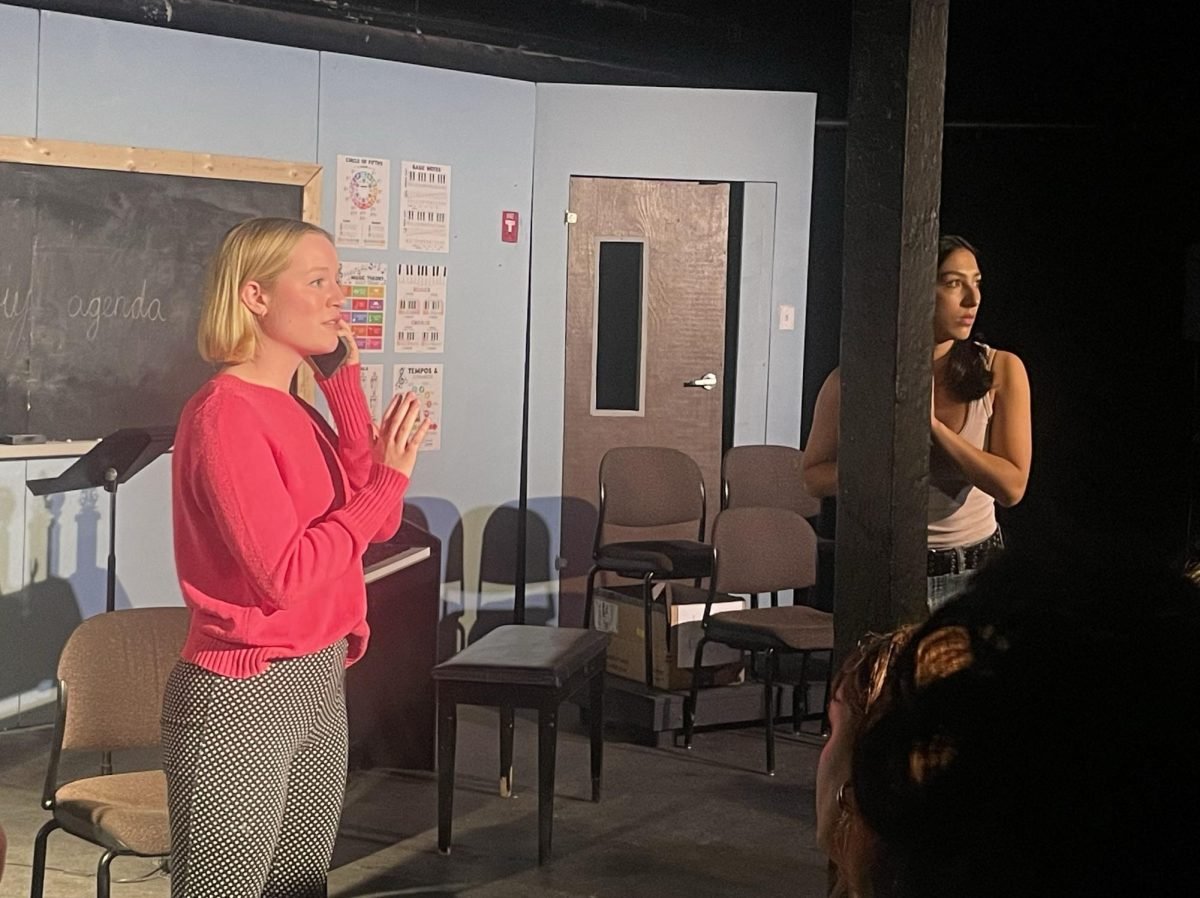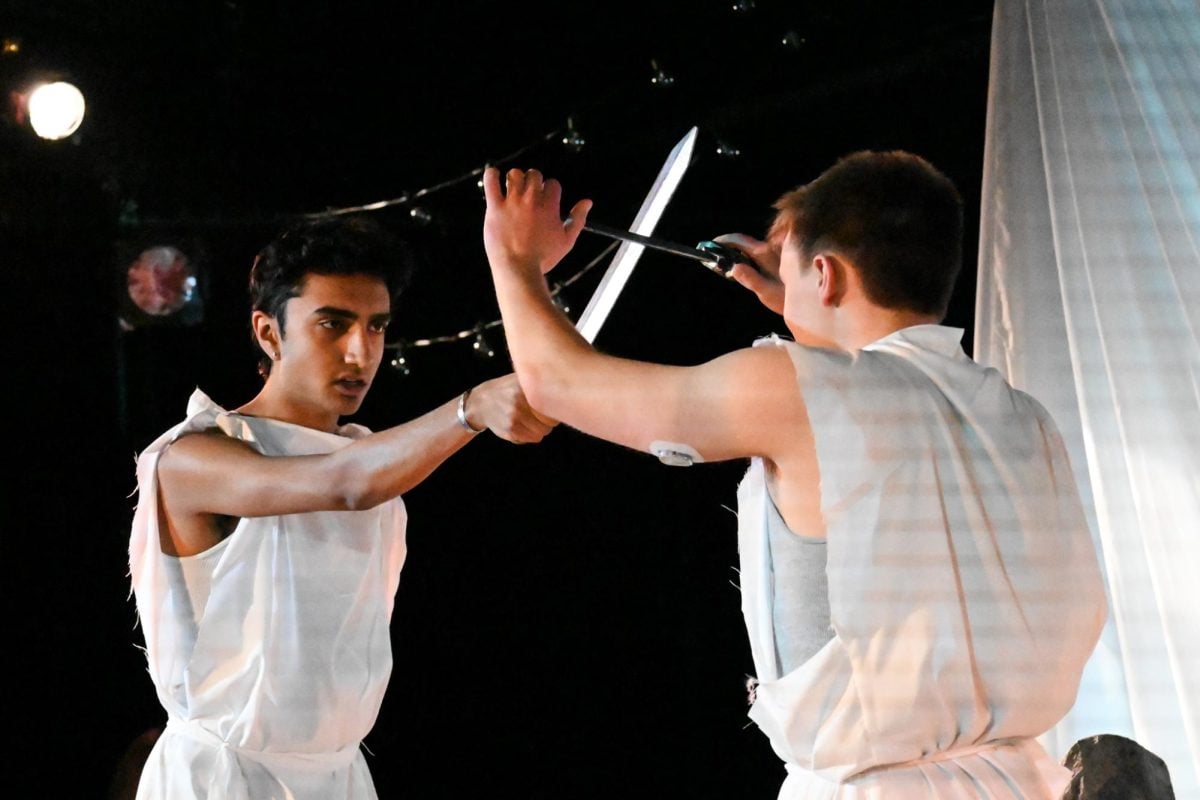Vertigo Productions’ spring play “Pity the Woman Who Never Spills” follows no prom queens or quarterbacks. The gauntlet of high school has left the five characters seeking refuge in the choir room, where they endure unrequited love, codependent relationships and anxieties about their futures. Although the show struggles to pace a story that takes place primarily in passing periods, the actors create an emotionally rich artifact of a senior year.
The student-written and -produced play had four showtimes in Shanley Pavilion Saturday and Sunday. Playwright and Communication senior Judy Lawrence notes in the program that she Googled “choir songs about women being messy” to find inspiration for the play’s title — and Elizabeth Alexander’s “Why I Pity the Woman Who Never Spills” struck a chord.
Indeed, the plotline showcases women being messy. New choir teacher Stella Sanders (Communication junior Caroline Drapeau) sees herself reflected in understated student Sammy (Communication senior Abby Aldrich), who harbors feelings for her best friend Mary (Communication freshman Mila Levit), who in turn develops a crush on their teacher.
Their interactions are further tangled by another student, Tim (Communication freshman Casey Bond), and guidance counselor Mr. Wallace (Communication sophomore Henry Davis-Piger) — both of whom are in a depressing state of arrested development.
Sanders and her unshown wife appear to be a distorted reflection of her students, Mary and Sammy. Drapeau’s portrayal of Sanders is particularly intriguing. She skillfully creates a character stoic in front of her students but full of raw emotion behind the beaded curtain that separates her office from the choir room.
The passage of a school year is marked by festive drawings or writing on a chalkboard. Dialogue ends abruptly as the lights fade to blue. The semi-autobiographical nature of the play leaves scenes feeling like diary entries, with emotions clearly stated and conflict repeatedly unpacked.
The play’s themes are at times undercut by the lack of connection between the piano at the center of the stage and the characters’ motivations. The power of music is a heavy point of conversation, but we rarely actually see them play music. Instead, the show focuses on the discomfort of fights between characters and their aftermath.
Among these, humorous moments executed with precise delivery arrive at the right times. “I need to get away from this town and like … my mother,” Mary said of her plans after high school. Although these lighthearted lines are written primarily for an audience of young people with experience in the performing arts, there is also a certain element of universal reliability in Lawrence’s highly personal play.
In this sense, the experience of senior year in the late ’10s is lovingly preserved, down to the inspirational posters on the walls and the familiar costume design. The specificity of this setting offers insights into the cultural perceptions of social status, sexuality and romantic relationships that our generation has grown up with and shaped.
Although the struggle of finding a stronger sense of self is well-developed as a central theme, the play builds toward a culmination of conflict that is ultimately unsatisfying. It misses opportunities to solidify the deeper message: acknowledging your feelings is crucial to grow as a person.
In a style heavily reminiscent of other media covering the high school experience, conflict centers around conversations heard through the walls and kisses seen through windows. The play, which has a running time of about 100 minutes, spends a heavy-handed half hour covering apologies and confessions.
While the audience is plunged into teenage moments most of us would want to forget, nostalgia touches the edges of the actors’ performance. The show reminds us that growing through what is complicated and uncomfortable takes unseen bravery. After casual declarations of love from Mary throughout the play, the last words of “Pity the Woman Who Never Spills” feel truly meaningful: “I love you.”
Email: jillianmoore2027@u.northwestern.edu
Twitter: @jillian_moore7
Related Stories:
— WAVE’s ‘Birthday Candles’ play creates rich emotional journey
— Cosmia Opera Collective breathes life into opera, uplifts underrepresented composers
— Multicultural cabaret hosted by Vibrant Colors Collective explores community













